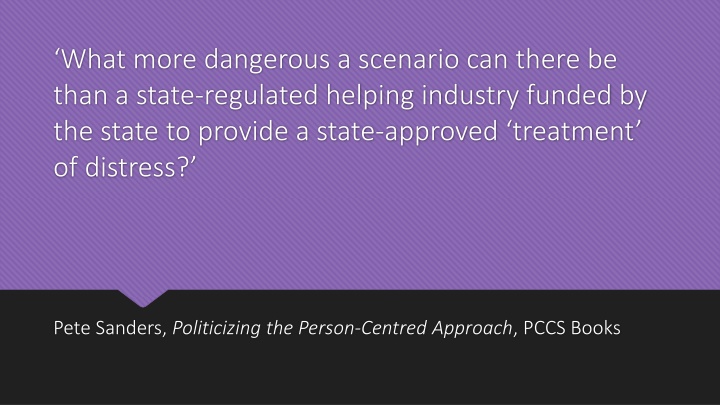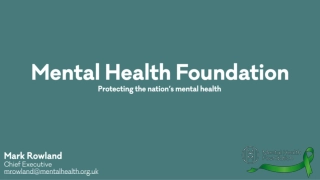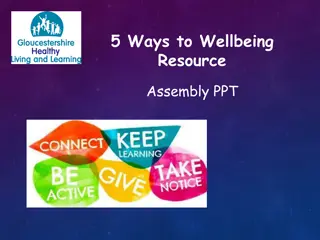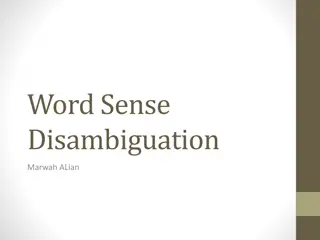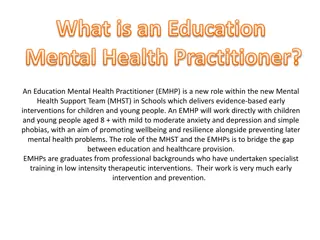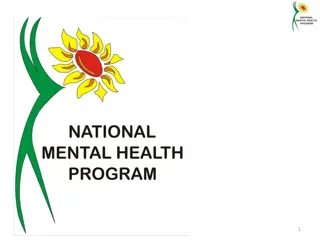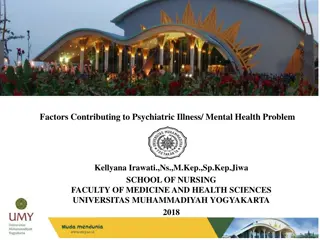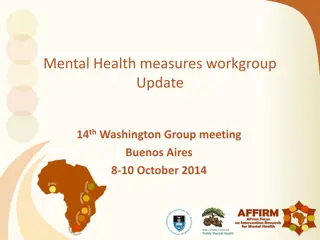Challenging State-Regulated Mental Health Approaches
The text questions the effectiveness and ethics of state-regulated mental health treatments, dismissing the biological approach as ineffective. It emphasizes the importance of listening, challenges the diagnostic labeling of conditions like schizophrenia, and advocates for understanding what has happened to individuals rather than what is wrong with them. The content highlights the dangers of relying solely on state-approved interventions and raises concerns about the misinterpretation and misuse of diagnostic labels such as ADHD.
Download Presentation

Please find below an Image/Link to download the presentation.
The content on the website is provided AS IS for your information and personal use only. It may not be sold, licensed, or shared on other websites without obtaining consent from the author.If you encounter any issues during the download, it is possible that the publisher has removed the file from their server.
You are allowed to download the files provided on this website for personal or commercial use, subject to the condition that they are used lawfully. All files are the property of their respective owners.
The content on the website is provided AS IS for your information and personal use only. It may not be sold, licensed, or shared on other websites without obtaining consent from the author.
E N D
Presentation Transcript
What more dangerous a scenario can there be than a state-regulated helping industry funded by the state to provide a state-approved treatment of distress? Pete Sanders, Politicizing the Person-Centred Approach, PCCS Books
I just I just know know that the biological approach to psychological distress is bollocks that the biological approach to psychological distress is bollocks I personally just can t be bothered to I personally just can t be bothered to argue argue about it any more with a new generation. I don t care what new evidence is supposedly advanced. I ve generation. I don t care what new evidence is supposedly advanced. I ve seen it all before. Fatuous, self seen it all before. Fatuous, self- -important professors in white coats staring at important professors in white coats staring at computer images of people s brain waves, computer images of people s brain waves, etc ideas to mesmerized television pundits who swallow the story whole and ideas to mesmerized television pundits who swallow the story whole and breathlessly reproduce it for the viewing millions. It s all crap and I m too old breathlessly reproduce it for the viewing millions. It s all crap and I m too old and too tired to be doing with it But that s and too tired to be doing with it But that s not dangerous and destructive and they have to be dealt with. dangerous and destructive and they have to be dealt with. about it any more with a new etc, expounding their half , expounding their half- -baked baked not the attitude. These ideas are the attitude. These ideas are David Smail, Clinical Psychology Forum, 1996
Listening is a universal activity we get into and out of difficulties with each other to a large extent by the way we listen and by what we hear, mishear and fail to hear. Goff Barrett-Lennard, Steps on a Mindful Journey: Person-centred expressions, PCCS Books
We have known for a long time that terms such as schizophrenia are scientifically meaningless. They are not actually diagnoses in a medical sense, since they are not based on patterns of bodily symptoms or signs. Instead, the criteria consist of a ragbag of social judgements about people s thoughts, feelings and behaviour. The people who are so labelled may well have difficulties and be in urgent need of help, but this is not the way to help them. Lucy Johnstone, www.madinamerica.com 2013
Instead of asking people what is wrong with you? , we ask them what has happened to you? Jacqui Dillon, Chair, Hearing Voices Network UK
ADHD is thus ideally placed as a convenient diagnostic dumping ground allowing all of us (parents, teachers, doctors, politicians) to avoid the messy business of understanding human relationships and institutions and their difficulties. Sami Timimi, Making and Breaking Children s Lives, PCCS Books
Do not interpret their [the clients] experience, tell them what it means or impose your own meanings on it. They are the expert. If they ask you to explain their experiences, be straight with them. Pete Sanders, PCCS Books Conference 2013
The simplest answer to the question of What do we do instead of diagnosing people? is Stop diagnosing people . The argument that we need a fully worked-out alternative system before we can abandon something that is admitted to be non-valid even by the people who invented it is, in my view, a complete red herring. And the simplest current alternative is to ask people what their problems are, and start from there. Lucy Johnstone, A Straight Talking Introduction to Psychiatric Diagnosis, 2014
The ironies are unending. The idealism that led me to study psychology was partly founded on a feeling that here, at least, there were still mysteries to be unravelled. In fact, as it turns out, psychology has done more to mystify the human condition than just about any other even remotely intellectual exercise. David Smail, Power, Interest and Psychology, PCCS Books
It does not pay to make even temporary concessions to logic you believe to be false, or professional conventions you believe unworthy. They haunt one forever. John Shlien, Professor of Education and Counseling Psychology, Harvard
A Bad Things Can Happen and Drive You Crazy' campaign has yet to be funded by government, despite its purported aim of following what the evidence base tells us. This, perhaps, is because the government can be responsible for at least some of the bad things. Dr Jay Watts, Huffington Post
those persons who consider themselves prisoners of psychiatry will accept and appreciate an offer of person-centred interaction as a welcome and beneficial refuge from other staff members active efforts at changing their perceptions of reality. Lisbeth Sommerbeck, The Client-Centred Therapist in Psychiatric Contexts, PCCS Books
I am still more frightened by the fearless power in the eyes of my fellow psychiatrists than by the powerless fear in the eyes of their patients. R.D. Laing, Wisdom, Madness and Folly, Canongate Books
Diagnosis is not good, not even neutral, but bad. Let s be straightforward and flat out about it, it is not only that its predictions are flawed, faulty and detrimental to the relationship and the client s self-determination; it is simply a form of evil. It labels and subjugates people in a ways that are difficult to contradict or escape. John Shlien, Professor of Education and Counseling Psychology, Harvard
Evidence is all the rage in mental health services. It is as if professionals have never received any training, never read any journals and spend their time randomly pulling treatments off their shelves. But it is more complicated than that. What one person calls evidence, another calls prejudice. Craig Newnes, This is Madness Too, PCCS Books
Both feminism and the Person-Centred Approach are responses to societies that structure personal and institutional relationships so that one group or individual has power over another. They are reactions against authorities and hierarchies of power which give some people the power to tell others what to do. Gillian Proctor and Mary Beth Napier, Encountering Feminism, PCCS Books
We must convert widespread mental health problems from medicalised conditions into effective antagonisms. Affective disorders are forms of captured discontent; this disaffection can and must be channelled outwards, directed towards its real cause, Capital. Mark Fisher, Capitalist Realism, Zero Books
Primary prevention research inevitably will make clear the relationship between social pathology and psychopathology and will work to change social and political structures in the interests of social justice. It is as simple and as difficult as that. George Albee, Past President of the American Psychological Association, 1996
